Power bigger than barks and bites
Those in need of therapeutic help receive it from an unlikely quarter

This is a job that those who are ill-tempered and unruly should not apply for. For that reason, Bian Yunyun, a Shanghai dog owner, felt she was onto a good thing.
Her candidate for the job: Sara, 6, now a calm and well-disciplined Chinese dog that Bian rescued from straydom six years ago when she was less than a year old.
The job Bian had in mind for Sara was as a therapist, so she decided to sign her up for professional lessons at Paw For Heal, a therapy dog training program in Shanghai, about a year ago.
At the end of last year Sara graduated from Paw For Heal and has since become qualified to provide canine assisted therapy for individuals with physical, cognitive or emotional disabilities, such as children with autism and veterans with post-traumatic stress syndrome.
Now Bian finds the therapy training a great example of how a combination of innate talent and out-ofbox ideas can reshape the relationship between human and our canine friends.
The founder of the Shanghai program, Wu Qi, 38, says: "We hope more people can show concern for vulnerable groups in society and help them, so we established the China Paw For Heal Therapeutic Dog Project eight years ago, letting dogs serve as a bridge between people and bringing warmth and love into their world.
"These people can feel the unconditional love of small animals. It also allows more people to see that dogs are not just family pets. There are many places where they can help humans."
The founder of what is believed to be China's first animal-assisted therapy program, dressed in a sweatshirt, pair of denims, black-frame glasses, is known by many as the "dog whisperer".
Over the past eight years Wu and his team have used therapy dogs to help more than 100,000 people and opened animal assistance projects in cities including Beijing, Shanghai, Nanjing, Chengdu and Shenzhen not only for vulnerable groups but also for groups under the intense pressure of work or study.
Of course those numbers are a drop in the bucket considering China's population, but they point to the fact that animal-assisted therapy is gaining a foothold in the country.
Wu's initiative gained momentum in April when Li Jiaqi, who has about 40 million followers on the Chinese internet platform TikTok, took his dog Never to train at Paw For Heal, and saw his "trouble maker" being transformed into a therapy dog.
His training sessions were made into a series of reality show style short films that received hundreds of millions of views on the internet.
In the sixth episode of the diary-style film Never and another dog were put through four sessions on the day of the evaluation: tests by volunteers, basic dog etiquette, an interference test and scenario simulation. In the last of these, in order to assess the tacit understanding between owner and dog and the owner's ability to cope with emergencies, staff members simulated some of the emergency acts of the vulnerable groups, and Never's response was so powerful that it brought tears to many who watched it.
Training program personnel are particularly interested in a dog's ability to carefully observe a person's behavior and interpret it correctly as well as identify its strengths and allow the dog to live out its potential.
Sara's owner Bian, now a volunteer at Wu's dog academy, says she admires Wu's determination to push the limits, push into the unknown and became closely acquainted with the special nature of her canine friends. Today many people across the country are benefiting from new forms of canine-assisted therapy.
"In these short films many people saw the real work content and process of the therapy dogs," Wu says.
"Elderly people with dementia, children with autism and others may seem away from everyone, or are rarely accessible in everyday life. Some may have even become rejected because of what people regard as weird behavior. A parent who has an autistic boy once told me that people confronted with unusual behavior in public often took her to task for failing to educate her child."
In 2012 a parent came across Wu, who had already made a name for himself in the field of pet training, and hoped to take his boy to watch the dog training, because he loves dogs. Wu agreed. When the child appeared, Wu found he was unwilling to speak and did not look at others, and Wu thought the child must be introverted.
It was not until the dog appeared that the boy became a little more animated, and later his parents told Wu that he was autistic. It was Wu's first such experience in dealing with someone who is autistic, and he began to wonder whether the boy's positive reaction on seeing the dog training meant it held out more possibilities.
Later, Wu learned that treatments that did not use drugs such as animal-assisted therapy had been used in Europe and the United States for more than 100 years, but it was almost unheard of in China. He had already made a name for himself with his pet training, but he suddenly realized that there was work for him to considerably widen the scope of what he was doing.
"I saw this huge gap between animal-assisted therapy in China and elsewhere. I knew a huge amount about animals as pets, and I had a ton of experience as a trainer. My idea of using dogs in stage performances that were filmed was very restricted. Small animals that have been trained can help those around them."
Wu would soon experience the lack of understanding that those with autism and their parents often go through. As he and others working for him contacted rehabilitation organizations promoting his idea of using animals therapeutically to help children with autism, they were almost always rebuffed by people either skeptical or even suspicious about the idea they were pushing.
Skepticism is something Wu has learned how to handle. It emanates not just from experts but from parents who not only doubt that this rather exotic treatment could offer any real help, but also that therapy dogs pose a danger to their children.
However, over time, through sheer persistence, Wu has managed to win over naysayers, and he says he has a long list of rehabilitation institutions for children with autism, elderly care institutions and schools that can offer testimonials on the good work he and his dogs are doing. Those having received canine therapy include elderly people with cognitive impairment, bone cancer and leukemia, people with physical disabilities and people with depression, he says.
In fact this month his therapy dog program was officially approved and piloted by a rehabilitation hospital in Shanghai, which asked not to be named. This is believed to be a first in China.
The courses center on animal-assisted therapy divided into two stages, basic and intermediate, with a total of 18 days of high-quality course content.
The intermediate courses include nursing care, psychological counseling, education and training for special children, teaching on how to combine therapy dogs to improve children's reading and dictation skills, and improving the expression skills of trainees.
Small animals are a social learning medium that can promote children's empathy, sharing spirit and practical abilities, and indeed can be an extension of parental education, Wu says.
"In fact, the way a child treats a small animal reflects whether the parent's way of educating the child is correct and reasonable, and whether the child's personality is normal."
This is just one good reason for encouraging families to keep pets and to train and teach them with correct concepts, he says.
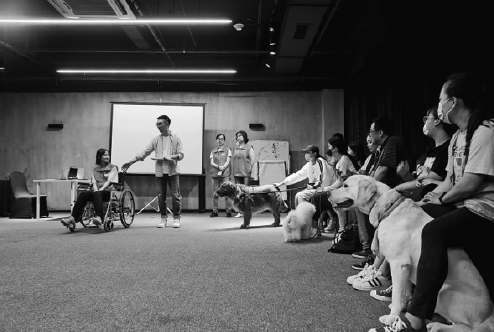
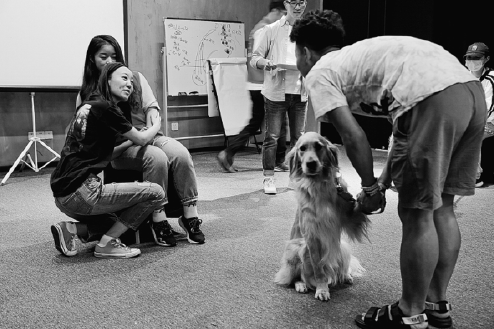

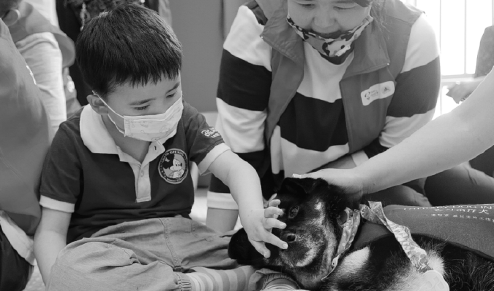
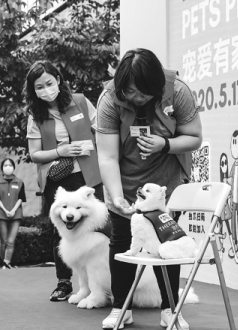
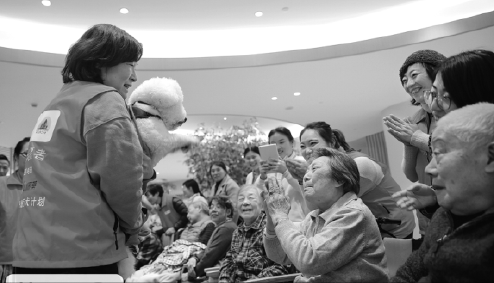
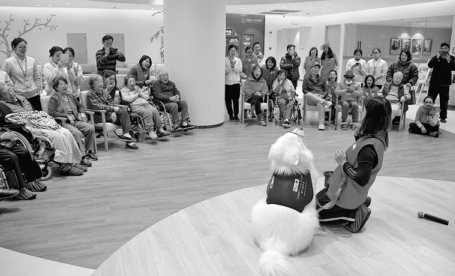
Today's Top News
- 952 suspects involved in telecom fraud in Myanmar's Myawaddy region escorted back to China
- Chinese defense ministry criticizes latest US defense bill
- China sets a world record in maglev technology
- Xi chairs CPC leadership meeting on Party conduct, anti-corruption work
- Why Hainan Free Trade Port stands out
- Rule of law strengthens business environment






























